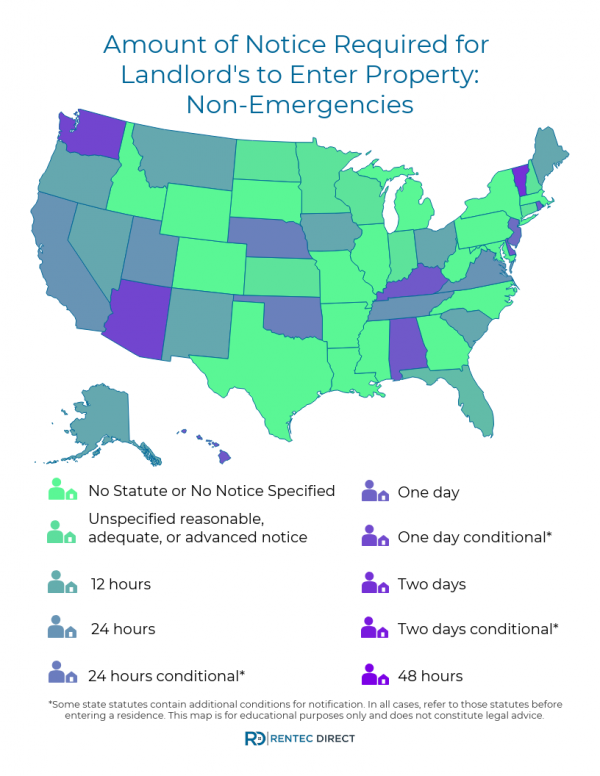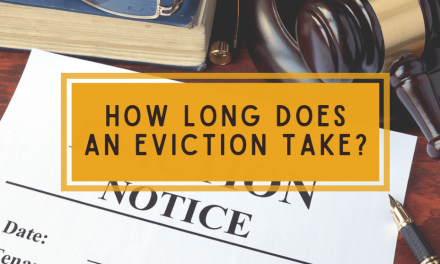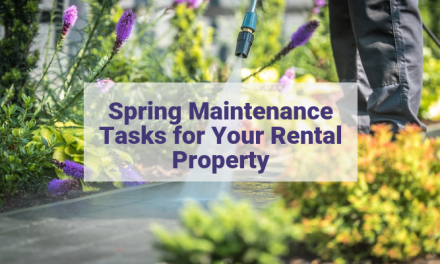
A landlord’s right of entry to a rental property is complex. There is a fine line between a tenant’s right to privacy and the landlord’s right to access a rental property. Many a headache, complaint, or even a lawsuit can be avoided when every landlord and tenant understand their rights and responsibilities within the relationship.
Common Reasons for a Landlord’s Right of Entry
Although there may be other reasons such as a court order or by tenant request, there are 5 common reasons a landlord may want to gain access to a rental property.
There are a plethora of inspections that landlords and property managers conduct that may warrant a notice such as move-in/move-out inspections, yearly inspections, termite and other pest inspections, seasonal inspections, etc. A tenant request for repairs granting permission to enter likely does not require a notice, although it may be best to coordinate and cooperate with a tenant beforehand. Inspection issues, routine maintenance, and property alterations or improvements may or may not require prior notice depending on the state regulations.
Notice State Information
A landlord may enter a rental unit without notice when a tenant has permitted entry; such as for a repair. However, when the tenant has not initiated the request, the landlord may be required by law to give advance notice. The following outlines the amount of notice required by that state, for which reasons notifications are required, linking to either the exact statute or the general statutes per state.
States Requiring Notification for the 5 Common Reasons Above
Alabama – Two days notice
(Ala. Code §§ 35-9A-303, 35-9A-423)
Alaska – 24 hours notice
(Alaska Stat. §§34.03.140,34.03.230)
District of Columbia (D.C.): 48 hours notice
(D.C. Code Ann. §42-3505.51)
Florida: 12 hours notice
(Fla. Stat. Ann. §83.53)
Hawaii – Two days notice
(Haw. Rev. Stat. §§521-53, 521-70(b))
Iowa – 24 hours notice
(Iowa Code Ann. §§562A.19, 562A.28, 562A.29)
Kansas – Reasonable notice
(Kan. Stat. Ann. §§58-2557, 58-2565)
Kentucky – Two days notice
(Ky. Rev. Stat. Ann. §§ 383.615, 383.670)
Montana: 24 hours notice
(Mont. Code Ann. §§70-24-312, 70-24-426)
Nebraska: One day notice
(Neb. Rev. Stat. §§76-1423, 76-1432)
New Mexico: 24 hours notice
(N.M. Stat. Ann. §§47-8-24, 47-8-34)
Oregon: 24 hours notice
(Or. Rev. Stat. §§90.322, 90.410)
Rhode Island: Two days notice
(R.I. Gen. Laws §34-18-26)
South Carolina: 24 hours
(S.C. Code Ann. §§27-40-530, 27-40-730)
Tennessee: 24 hours conditional (see state statute for specific conditions)
(Tenn. Code Ann. §§66-28-403, 66-28-507)
Virginia: 24 hours conditional (see state statute for specific conditions)
(Formerly Va. Code Ann. §§55-248.18, 55-248.33. Code Ann. §§55 has been replaced by Va. Code Ann. §§55.1 as of October 1, 2019).
17 States with one Exception: Extended Tenant Absence
The following states require notification for inspections, repairs, showing the property, and emergencies. However, no advance notice is necessary for a landlord’s right of entry when a tenant is on an extended absence. Check with the state statute to determine if that means no entry is allowed or if no notice is needed.
Arizona – Two days conditional (see state statute for specific conditions)
Ariz. Rev. Stat. Ann. § 33-1343
California – 24 hours conditional (see state statute for specific conditions)
Cal. Civ. Code §1954
Connecticut – Reasonable notice
Conn. Gen. Stat. Ann. §§ 47a-16 to 47a-16a
Delaware – Two days notice
Del. Code Ann. tit. 25, §§ 5509, 5510
Indiana – Reasonable Notice
Ind. Code Ann. §32-31-5-6
Maine – 24 hours notice
Me. Rev. Stat. Ann. tit. 14, § 6025
Massachusetts – No notice specified
Mass. Gen. Laws Ann. ch. 186, §15B(1)(a)
Minnesota – Reasonable notice
Minn. Stat. Ann. §504B.211
Nevada – 24 hours notice
Nev. Rev. Stat. Ann. § 118A.330
New Hampshire – Adequate notice under the circumstances
N.H. Rev. Stat. Ann. § 540-A:3
New Jersey – One day conditional (see state statute for specific conditions)
N.J.A.C. 5:10-5.1
North Dakota – Reasonable notice
N.D. Cent. Code §47-16-07.3
Ohio – 24 hours notice
Ohio Rev. Code Ann. §§ 5321.04(A)(8), 5321.05(B)
Oklahoma – One day notice
Okla. Stat. Ann. tit. 41, § 128
Vermont – 48 hours notice
Vt. Stat. Ann. tit. 9, § 4460
Washington – Two days conditional (see state statute for specific conditions)
Wash. Rev. Code Ann. § 59.18.150
Wisconsin – Advance notice
Wis. Stat. Ann. §704.05(2)
3 States with Additional Exceptions
Arkansas – No notice specified
No notice needed for an extended tenant absence nor during an emergency
Ark. Code Ann. §18-17-602
Louisiana – No notice specified
The only notice requirement is for entrance to conduct repairs, improvements, or alterations.
La. Civ. Code art.2693
Utah – 24 hours notice conditional (unless the rental agreement specifies otherwise)
Utah requires notification for emergencies and repairs but no other reasons are listed within the statutes.
Utah Code Ann. §§57-22-4, 57-22-5(2)(c)
15 States with No Statutes
The following states have no statutes regarding landlord property access. Therefore it is important to review the rental agreement or lease for any clauses or sections relating to the tenant’s right to privacy or landlord’s rights to enter the property.
- Colorado
- Georgia
- Idaho
- Illinois
- Maryland
- Michigan
- Mississippi
- Missouri
- New York
- North Carolina
- Pennsylvania
- South Dakota
- Texas
- West Virginia
- Wyoming

Note: This guide is for educational purposes only and does not constitute legal advice. Prior to entering a residence or property, review the rental agreement or lease terms and check with your state statutes on exceptions, reasonable hours, reasons for entry, how to provide notification, or other nuances. Please speak with an attorney familiar with landlord-tenant law in your state if you require further clarification or need assistance. These links and information are current as of November 1, 2019, and may not reflect changes to legislation if viewed after this date.






Heather, thanks for the information! Tenancy regulations stipulate that the tenant has a legitimate right to privacy, meaning that the landlord is not permitted entry into the property at any hour or for any reason. Therefore, even though the tenant has requested repairs, the landlord cannot enter the rental unit without permission unless the tenant gives permission when the landlord enters the unit to do the repairs.
I called my city hall to see if the property I’m renting is suppose to be occupied and they didn’t find my address